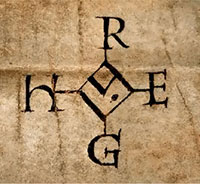
Monogram of Hugh Capet (980s AD)
Who was Hugh Capet?
When the Carolingians died out in 987 AD, the lords of France met to choose a new king. They chose a man named Hugh Capet (hyoo ka-PAY). Hugh Capet was picked for being weak, so the lords could do whatever they wanted and the king wouldn’t be able to do anything about it.
More about the Carolingians
High Middle Ages timeline
All our Medieval Europe articles
Early Capetian kings of France
His successors, Robert II, Henry I, and Philip I, also didn’t have much power. Some of the lords in their kingdoms controlled more land than the kings did, and were more powerful.
Mainly the Capetians (the descendants of Hugh Capet) succeeded because they lived a long time and always had grown up sons to succeed them, so there were not many opportunities to place any other king on the throne.
France gets richer

Outer walls of Caen castle, Normandy, France
Meanwhile, the French lords tried to govern their own provinces, more or less independently. Some did better than others, but gradually the lords figured out a good system.
More about feudalism
What are taxes?
Medieval warfare
The medieval economy
They got some cash income for themselves through charging tolls on roads, charging fees for establishing markets and fairs, and from selling what their tenants grew on their own land. They required and enforced regular military service from their vassals. By 1100 AD, most of France was peaceful and rich, even without the power of the king.
France fights overseas for colonies
Instead of fighting as paid mercenaries, French soldiers began to conquer things for themselves. The dukes of Normandy conquered England in 1066 AD, and sent some younger sons to take over southern Italy about the same time.
What’s a mercenary?
Norman conquest of England
The First Crusade
St. Sernin in Toulouse
The Count of Toulouse conquered Jerusalem from the Fatimids on the First Crusade. Many other soldiers went to Spain to fight as mercenaries against the Arab caliphs there and try to make their fortunes. But the great lords of France were almost entirely independent of the king, who had very little power outside his own land around Paris. The Count of Toulouse was rich enough to build a great Romanesque church, St. Sernin in Toulouse.
King Louis the Fat gets more power

Bell tower of St. Sernin (and the apse)
But in the 1100s AD the Capetian kings began to get more power, possibly thanks to the Medieval Warm Period. Louis the Fat (LEW-ee) (1108-1137) managed to get his own land around Paris firmly under his own control. He became known as a king who took care of the poor people, and so he got the support of the Church.
What’s the Medieval Warm Period?
What’s an abbot?
Henry V of Germany
Abbot Suger advises the king
To help Louis, the Church gave him the Abbot Suger (SOOJ-ay) as an advisor. Suger was very smart and was very helpful to King Louis. Even the strong lords of France began to ask King Louis to lead them in battle (against Henry V of Germany) or to judge important court cases.
Louis and Eleanor of Aquitaine
Louis the Fat’s son, who was also named Louis (a lot of French kings were named Louis!), married the daughter of one of these strong lords. Her name was Eleanor, and she ruled Aquitaine, which covers most of southern France. In this way Louis and Eleanor formed a much more powerful kingdom. But Louis VII was only sixteen when he became king, and Eleanor was only fifteen. They were too young to really use the power they had. And when they went on the Second Crusade, they got into a fight with each other. Louis suspected Eleanor of seeing other men. They never really got along after that.
Eleanor of Aquitaine
The Second Crusade
In 1152, when Louis was thirty-one, he divorced Eleanor for flirting with Henry of Anjou and lost control of Aquitaine. The western half of what is now France fell under the control of Henry II of England. But Louis’ power increased anyway: more and more, the lords brought their arguments to Louis for him to settle them, instead of starting wars against each other. And more and more, Louis spoke for France when other countries were involved.